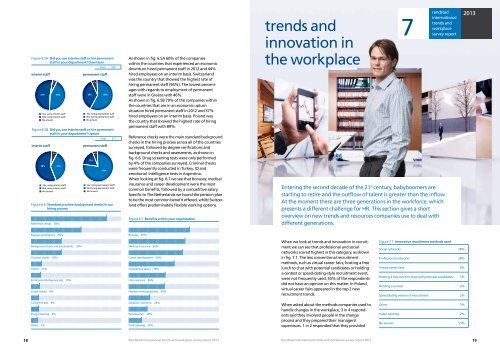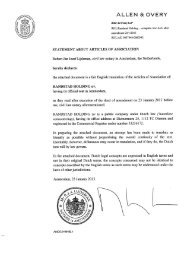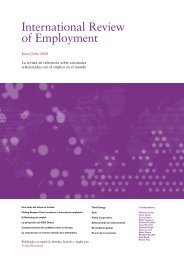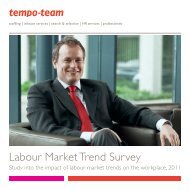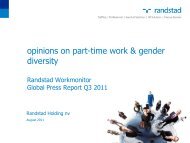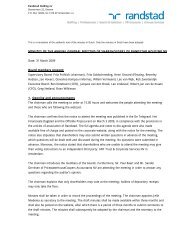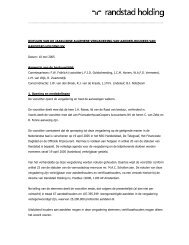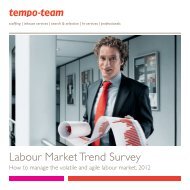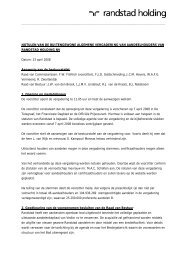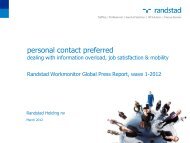randstad international trends and workplace survey report
randstad international trends and workplace survey report
randstad international trends and workplace survey report
Create successful ePaper yourself
Turn your PDF publications into a flip-book with our unique Google optimized e-Paper software.
Figure 6.5A Did you use interim staff or hire permanent<br />
staff in your department? Downturn<br />
Total 630<br />
interim staff permanent staff<br />
Figure 6.6 St<strong>and</strong>ard practices background checks in our<br />
hiring process<br />
Reference checks 83%<br />
Degree verifications 55%<br />
Background check <strong>and</strong> asessements 33%<br />
Criminal checks 33%<br />
IQ test 11%<br />
Emotional intelligence test 10%<br />
Credit checks 9%<br />
Culture fit test 8%<br />
Drug screening 4%<br />
Other 7%<br />
3%<br />
53% 44% 36% 60%<br />
Yes, using interim staff<br />
Not using interim staff<br />
No answer<br />
4%<br />
Yes, hiring permanent staff<br />
Not hiring permanent staff<br />
No answer<br />
Figure 6.5B Did you use interim staff or hire permanent<br />
staff in your department? Upturn<br />
Total 371<br />
interim staff permanent staff<br />
5%<br />
58% 37%<br />
Yes, using interim staff<br />
Not using interim staff<br />
No answer<br />
17%<br />
4%<br />
79%<br />
Yes, hiring permanent staff<br />
Not hiring permanent staff<br />
No answer<br />
As shown in fig. 6.5A 60% of the companies<br />
within the countries that experienced an economic<br />
downturn hired permanent staff in 2012 <strong>and</strong> 44%<br />
hired employees on an interim basis. Switzerl<strong>and</strong><br />
was the country that showed the highest rate of<br />
hiring permanent staff (94%). The lowest percentages<br />
with regards to employment of permanent<br />
staff were in Greece with 46%.<br />
As shown in fig. 6.5B 79% of the companies within<br />
the countries that are in an economic upturn<br />
situation hired permanent staff in 2012 <strong>and</strong> 37%<br />
hired employees on an interim basis. Pol<strong>and</strong> was<br />
the country that showed the highest rate of hiring<br />
permanent staff with 89%.<br />
Reference checks were the main st<strong>and</strong>ard background<br />
checks in the hiring process across all of the countries<br />
<strong>survey</strong>ed, followed by degree verifications <strong>and</strong><br />
background checks <strong>and</strong> assessments, as shown in<br />
fig. 6.6. Drug screening tests were only performed<br />
by 4% of the companies <strong>survey</strong>ed. Criminal checks<br />
were frequently conducted in Turkey, IQ <strong>and</strong><br />
emotional intelligence tests in Argentina.<br />
When looking at fig. 6.7 we see that bonuses, medical<br />
insurance <strong>and</strong> career development were the most<br />
common benefits, followed by a competitive salary.<br />
Specific to The Netherl<strong>and</strong>s we found the pension plan<br />
to be the most common benefit offered, whilst Switzerl<strong>and</strong><br />
offers predominately flexible working options.<br />
Figure 6.7 Benefits within your organization<br />
Bonuses 67%<br />
Medical insurance 62%<br />
Career development 59%<br />
Competitive salary 50%<br />
Life insurance 40%<br />
Flexible working options 39%<br />
Disability insurance 23%<br />
Pension plan 20%<br />
Profit sharing 14%<br />
<strong>trends</strong> <strong>and</strong><br />
innovation in<br />
the <strong>workplace</strong><br />
Entering the second decade of the 21 st century, babyboomers are<br />
starting to retire <strong>and</strong> the outflow of talent is greater than the inflow.<br />
At the moment there are three generations in the workforce, which<br />
presents a different challenge for HR. This section gives a short<br />
overview on new <strong>trends</strong> <strong>and</strong> resources companies use to deal with<br />
different generations.<br />
When we look at <strong>trends</strong> <strong>and</strong> innovation in recruitment<br />
we can see that professional <strong>and</strong> social<br />
networks scored highest in this category, as shown<br />
in fig. 7.1. The less conventional recruitment<br />
methods, such as virtual career fairs, hosting a free<br />
lunch to chat with potential c<strong>and</strong>idates or holding<br />
a contest or speed-dating-style recruitment event,<br />
were not frequently used. 53% of the respondents<br />
did not have an opinion on this matter. In Pol<strong>and</strong>,<br />
virtual career fairs appeared in the top 2 new<br />
recruitment <strong>trends</strong>.<br />
When asked about the methods companies used to<br />
h<strong>and</strong>le changes in the <strong>workplace</strong>, 3 in 4 respondents<br />
said they involved people in the change<br />
process <strong>and</strong> they prepared their managers/<br />
supervisors. 1 in 2 responded that they provided<br />
18 R<strong>and</strong>stad <strong>international</strong> <strong>trends</strong> <strong>and</strong> <strong>workplace</strong> <strong>survey</strong> <strong>report</strong> 2013 R<strong>and</strong>stad <strong>international</strong> <strong>trends</strong> <strong>and</strong> <strong>workplace</strong> <strong>survey</strong> <strong>report</strong> 2013<br />
19<br />
7<br />
<strong>r<strong>and</strong>stad</strong><br />
<strong>international</strong><br />
<strong>trends</strong> <strong>and</strong><br />
<strong>workplace</strong><br />
<strong>survey</strong> <strong>report</strong><br />
Figure 7.1 Innovative recruitment methods used<br />
Social networks 28%<br />
Professional networks 28%<br />
Virtual career fairs 6%<br />
Hosting a free lunch to chat with potential c<strong>and</strong>idates 5%<br />
Holding a contest 3%<br />
Speed dating version of recruitment 2%<br />
Other 3%<br />
Video resumes 2%<br />
No answer 53%<br />
2013


